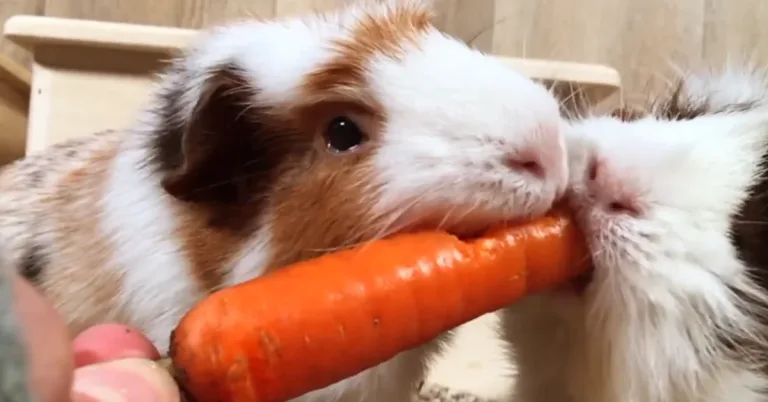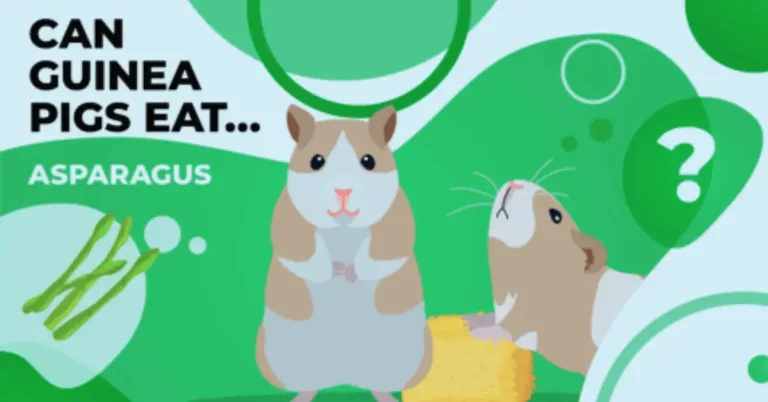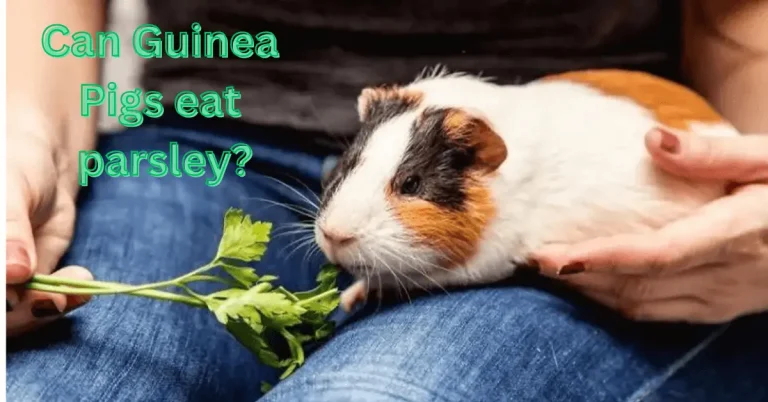Here we discuss, ‘Can Guinea Pigs Eat Cucumber Safely?’ Guinea pigs love to eat and usually enjoy a diet of hay, grass, and special pellets. However, introducing fresh fruits and vegetables can provide extra nutrients and add variety to their diets. One common question many guinea pig owners have is, ‘Can guinea pigs eat cucumbers?’ In this extensive guide, we’ll talk all about giving cucumbers to guinea pigs. We’ll cover what’s good about it, what to be careful about, and provide answers to common questions from pet owners.
Nutritional Benefits of Cucumbers for Guinea Pigs
Cucumbers may not match the nutrient richness of hay or pellets, but they provide several valuable benefits for guinea pigs like:
1. Vitamin C Enrichment
Vitamin C is essential for guinea pigs since they can’t produce it on their own. A deficiency can lead to severe health issues. Cucumbers are a fantastic source of vitamin C, making them a crucial addition to your guinea pig’s diet.
2. Hydration Support
With an impressive water content of approximately 96%, cucumbers are a fantastic source of hydration, especially during hot summer months. Proper hydration is vital for guinea pigs, and cucumbers can help ensure they remain adequately hydrated.
3. Antioxidant-Rich
Cucumbers contain antioxidants that help neutralize harmful free radicals within your guinea pig’s body. These antioxidants contribute to overall health and may reduce the risk of chronic diseases.
4. Low in Calories and Fat
Cucumbers are low in calories and fat, making them a healthy addition to your guinea pig’s diet without the risk of weight gain.
Nutritional Values of Cucumber
Cucumbers are packed with various vitamins, minerals, and antioxidants that can contribute to your guinea pig’s overall health. Let’s take a closer look at the nutritional content of cucumbers for every 100 grams.
| Nutrient | Amount |
| Vitamin C | 2.8 mg |
| Fiber | 0.5 g |
| Sugar | 1.67 g |
| Protein | 0.65 g |
| Calories | 15 kcal |
| Calcium | 16 mg |
| Potassium | 147 mg |
| Magnesium | 13 mg |
| Vitamin A | 105 IU |
| Phosphorus | 24 mg |
| Carbohydrate | 3.63 g |
Are There Risks to Feeding Cucumbers?
While guinea pigs eat cucumbers and it offer numerous benefits, there are some potential risks to be aware of:
1. High Water Content
Guinea pigs are sensitive to excessive water intake. Overfeeding cucumbers can lead to stomach upset and diarrhea due to their high water content. Therefore, moderation is key to preventing these issues.
2. Limited Nutrient Density
Cucumbers, while rich in some vitamins and minerals, are not as nutrient dense as other vegetables. Relying solely on cucumbers can result in nutrient deficiencies. To ensure a well rounded diet, include various vegetables and fruits in your guinea pig’s meals.
How Much Cucumber Can Guinea Pigs Eat?
Guinea pigs can enjoy cucumbers a few times a week, with portion control being essential. It’s recommended to offer a couple of thin slices or one thicker half-inch slice per serving. This is especially important as the high water content of cucumbers can lead to diarrhea if overconsumed.
To maintain your guinea pig’s optimal health, ensure they receive a diet rich in vitamin C by complementing cucumber intake with sources like oranges, guava, kiwi, strawberries, and broccoli.
Do Guinea Pigs Like Cucumbers?
Cucumbers are a favorite treat for many guinea pigs, thanks to their mild, sweet flavor. Most guinea pigs readily accept them and come to enjoy them. However, it’s worth noting that individual preferences may vary, so your guinea pig may or may not take to cucumbers right away. If your furry friend isn’t particularly fond of cucumbers, don’t be discouraged, as there are plenty of other nutritious snacks to explore.

Serving Cucumbers to Guinea Pigs
When serving cucumbers to your guinea pigs, consider various options to suit their preferences and needs:
- Cucumber Cubes: Cut cucumbers into small cubes, leaving the skin and seeds intact so your guinea pigs can nibble at their own pace.
- Spiralized Cucumbers: Using a spiralizer, create cucumber “noodles” that your guinea pigs can play with and eat as they see fit.
- Interactive Toys: Fill interactive toys with cucumber pieces to provide both entertainment and a tasty treat for your pets.
Safe Vegetables for Guinea Pigs
In addition to cucumbers, several other safe vegetables can diversify your guinea pig’s diet:
- Broccoli: A rich source of vitamin C and various other nutrients. However, it should be served in moderation due to its oxalate content.
- Carrots: These provide essential nutrients that guinea pigs need for their well-being. Still, limit servings to a few times a week.
- Cabbage: Offering small portions of cabbage can provide extra vitamin C and enjoyable crunch for guinea pigs.
Common Questions About Feeding Cucumbers to Guinea Pigs
1. Can guinea pigs eat cucumber peels?
Yes, guinea pigs can safely consume cucumber peels. In fact, cucumber peels contain more fiber and higher levels of nutrients compared to the inner flesh. It’s healthier to leave the peels on, but be sure to rinse the cucumber thoroughly to remove any potentially harmful residue.

2. Can guinea pigs eat cucumber seeds?
Yes, guinea pigs can eat cucumbers with the seeds intact. Cucumber seeds are typically soft and safe to consume, so there’s no need to remove them.

3. Can baby guinea pigs eat cucumbers?
Baby guinea pigs can start eating cucumbers once they’ve reached the weaning age of 3-4 weeks. However, introduce cucumbers gradually to avoid potential stomach problems due to their high water content. It’s essential to provide a well-balanced diet with high-quality pellets and other vitamin-rich vegetables for growing guinea pigs.
4. Can guinea pigs eat cucumber peels or skin?
Guinea pigs can safely eat cucumber peel or skin, and it even offers some nutritional benefits. The peel contains extra fiber, promoting healthy digestion and preventing issues like constipation. Additionally, it has higher concentrations of vitamins, minerals, and antioxidants compared to the watery flesh, making it a valuable addition to their diet. When offering cucumber skin, ensure you wash it thoroughly to remove any potential contaminants. Remember that it should be part of a diverse array of fresh vegetables and leafy greens in your guinea pig’s diet to provide a well-rounded and nutritious meal.
5. Can guinea pigs eat cucumber leaves?
Guinea pigs can eat cucumber leaves, but these should be considered an occasional treat rather than a staple in their diet. Cucumber leaves lack the same nutrient density as other leafy greens commonly recommended for guinea pigs, such as romaine lettuce or kale. Ensure that the leaves are pesticide free and wash them thoroughly to eliminate any potential residues. While guinea pigs may enjoy the variety, cucumber leaves should not replace the essential components of their diet, which include high quality hay, pellets, and fresh water.

6. Can guinea pigs eat cucumber daily?
Guinea pigs can eat cucumber, but it’s best to offer it as an occasional treat, not daily. Cucumbers have high water content, so daily consumption can lead to digestive issues. Guinea pigs need a balanced diet with hay, pellets, and water as their primary foods, supplemented by a variety of veggies and greens for nutrition and variety.
Conclusion
Guinea pigs eat cucumbers and it can be a healthy and enjoyable addition to your guinea pig’s diet. When fed in moderation, they provide essential vitamin C, hydration, and a delightful treat for your furry friends. However, it’s crucial to be mindful of portion sizes to prevent stomach upset. To maintain your guinea pig’s overall health and happiness, combine cucumbers with a balanced diet of hay, pellets, and other vegetables. By following these guidelines and providing answers to common questions, you can ensure your guinea pigs remain content, healthy, and well informed about their dietary options.







